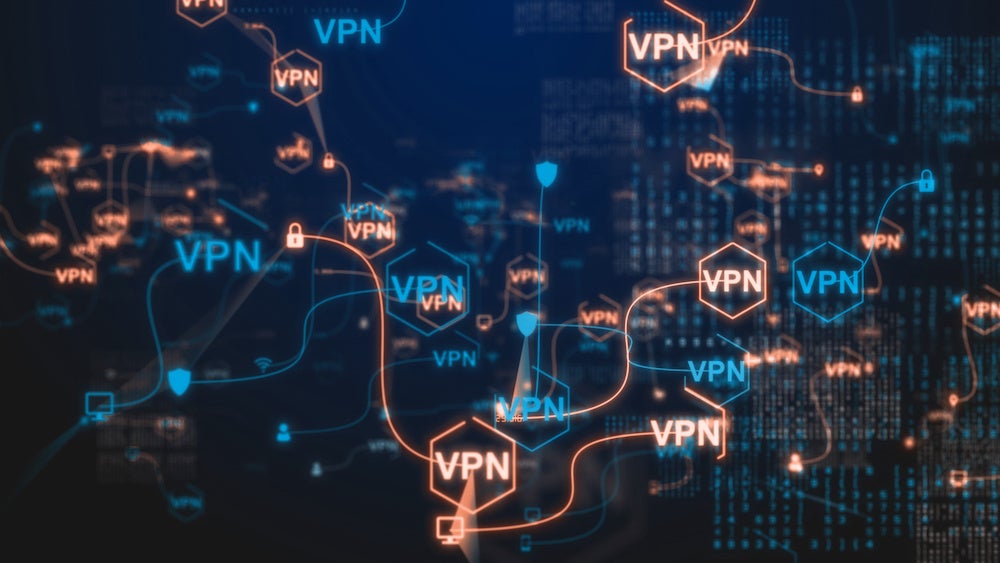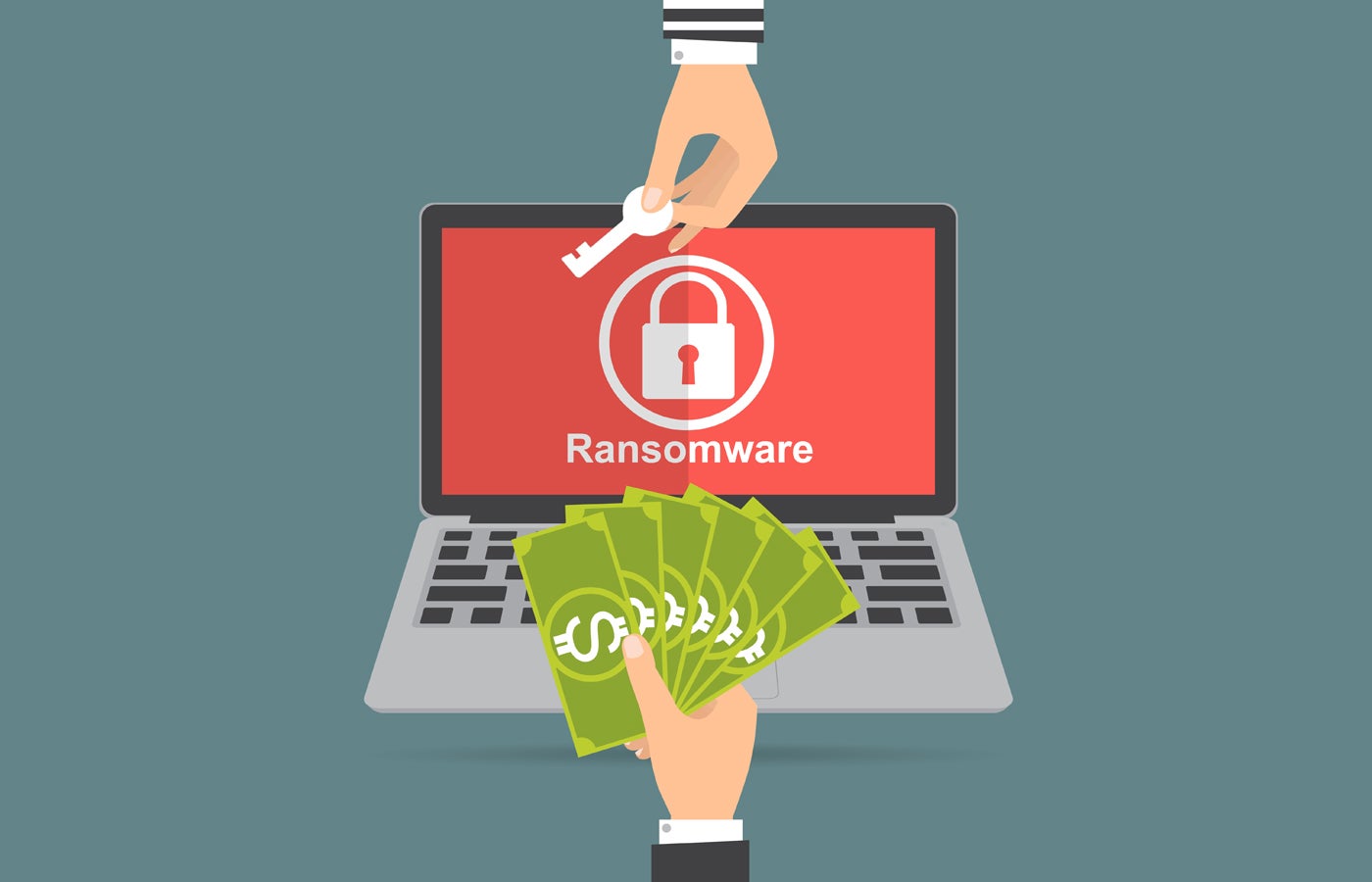PureVPN fast factsOur rating: 3.7 stars out of 5
|
PureVPN’s 6,000+ servers across more than 65+ countries make it an attractive choice for users looking for a virtual private network with an extensive server network. It provides more flexibility for unblocking content and offers faster speeds. PureVPN’s Windows application also has an intuitive design, making for user-friendly navigation.
Unfortunately, PureVPN suffers from a controversial logging incident with the Federal Bureau of Investigation that prevents it from being a top security recommendation. While it has made efforts to rebuild trust, its overall package may not be enough for more privacy-focused users.
How much does PureVPN cost?
| Duration | Plans | |||
|---|---|---|---|---|
| Standard | Plus | Max | Teams | |
| 1 year | $3.99 per month | $5.82 per month | $7.07 per month | $5.45 per use, per month; min.of 2 users |
| 2 years | $2.14 per month | $2.96 per month | $4.07 per month | $4.75 per use, per month; min.of 2 users |
| 1 month | $12.95 per month | $15.95 per month | $19.95 per month | $8.95 per use, per month; min.of 2 users |
| 5 years | $2.16 per month | $2.66 per month | $3.33 per month | N/A |
| What’s included? | VPN service |
|
|
In 2024, PureVPN introduced a new subscription tier called Teams. This is on top of its original subscription tiers: PureVPN Standard, Plus, and Max. Below are the main feature differences amongst these options:
- PureVPN Standard comes with the VPN service itself and a tracker blocker.
- PureVPN Plus includes all Standard features plus a password manager.
- PureVPN Max includes all Plus features plus Remove My Data capabilities and Dark Web Monitoring.
- PureVPN Teams built for remote teams and includes a centralized admin dashboard, 24/7 customer support, and support for up to 200 members.
Before choosing a plan, I recommend trying PureVPN’s seven-day free trial. While there isn’t a dedicated trial for desktop, a trial is accessible via PureVPN’s mobile apps on iOS or Android. Once you sign up for the free trial on a mobile device, you can log into your account via desktop. The trial allows users to choose which subscription (Standard, Plus, Max) they want to test drive. In my experience, setting up the free trial was easy and trouble-free.
If you plan on using a paid plan, PureVPN Plus for two years at $2.96 per month is the best option. This is fairly affordable compared to other VPNs with the same duration and affords you PureVPN’s extra features like its password manager. It’s also a better option compared to the monthly $12.45 Standard subscription that is on the pricier end for a monthly plan.
PureVPN also introduced a new five-year plan in 2024 that wasn’t available last year. While I appreciate the cost savings with the smaller monthly fee, I personally think it’s smarter to opt for the shorter-term options. This allows you the flexibility of not renewing your contract within a shorter period, especially considering how VPN services can change over time, such as with security incidents or major feature changes.
I would’ve preferred if either the additional password manager or dark web monitor were included in the base VPN subscription itself; this would’ve given PureVPN more unique features to set it apart from the competition.
You can purchase either the Plus or Max subscriptions to get these features, but having at least one of them included, without an additional payment, would’ve given PureVPN more bang-for-your-buck value.
Is PureVPN safe and trustworthy?
I wouldn’t recommend PureVPN if safety is a priority. On paper, PureVPN looks like a secure VPN, with its quality security protocols and impressive “always-on” audits. However, its logging incident in 2017 and the lack of in-depth information on the audits themselves leave much to be desired.
PureVPN comes with the three most important security protocols for a modern VPN: OpenVPN, WireGuard, and IPSec/IKEv2. It also features AES 256-encryption, a kill switch, and domain name system leak protection.
Unfortunately, an issue arises with its no-logs policy. Like most VPNs, PureVPN claims to have a no-logs policy where they state that they don’t log browsing activities, connection logs, original IPs, and browsing history.
However, PureVPN was involved in an incident back in 2017 where the company allegedly handed off logs to the FBI. In particular, the FBI used logs from PureVPN to track down a suspected cyberstalker and harasser. While catching such criminals is important, the problem was in PureVPN’s privacy policy at the time — which stated that it kept no logs. This is a big blow to the credibility of PureVPN’s no-logs policy, especially because keeping anonymity is one of the main reasons to use a VPN.
Since then, PureVPN has come out with third-party audits that verify their no-logs policy. First was with Altius IT in 2019 and the second with KPMG in 2021 — both finding no evidence of the company keeping any logs. The KPMG audit is noteworthy because it was an “always-on” audit that allowed KPMG to audit PureVPN’s network without prior notice.
As I revisited PureVPN in 2024, I saw that it had undergone a fourth audit on its no-logs policy. However, I found it difficult to get more in-depth information on the audit itself.
When you look at the web page, there’s no clear data on which firm audited PureVPN. It also lacks outgoing links redirecting readers to the audit report. The page just says, “Well known audit firm was recently engaged in an exercise to assess the compliance of our VPN infrastructure with our privacy policy.”
After that, it states that the audit had reaffirmed how PureVPN does not log a user’s origin IP address and does not log a user’s assigned VPN IP address, among other things. To me, the better approach would be to have a clear external link to the third-party audit or have more detailed info on the findings itself. This would build more credibility for both the audit and PureVPN’s no-logs policy.
I found another PureVPN blog post, dated June 2024, that said that the VPN’s privacy policy was “no-logs certified.” This one had a bit more information, saying that PureVPN had again engaged with Altius IT and found that PureVPN had no systems in place, which would “lead to identifying a specific person and/or the person’s activity when using the PureVPN service.” Unfortunately, there was once again no external link to a full report and shared very minimal detail about the audit proper itself (such as when the audit was done or what aspects of PureVPN were specifically reviewed).
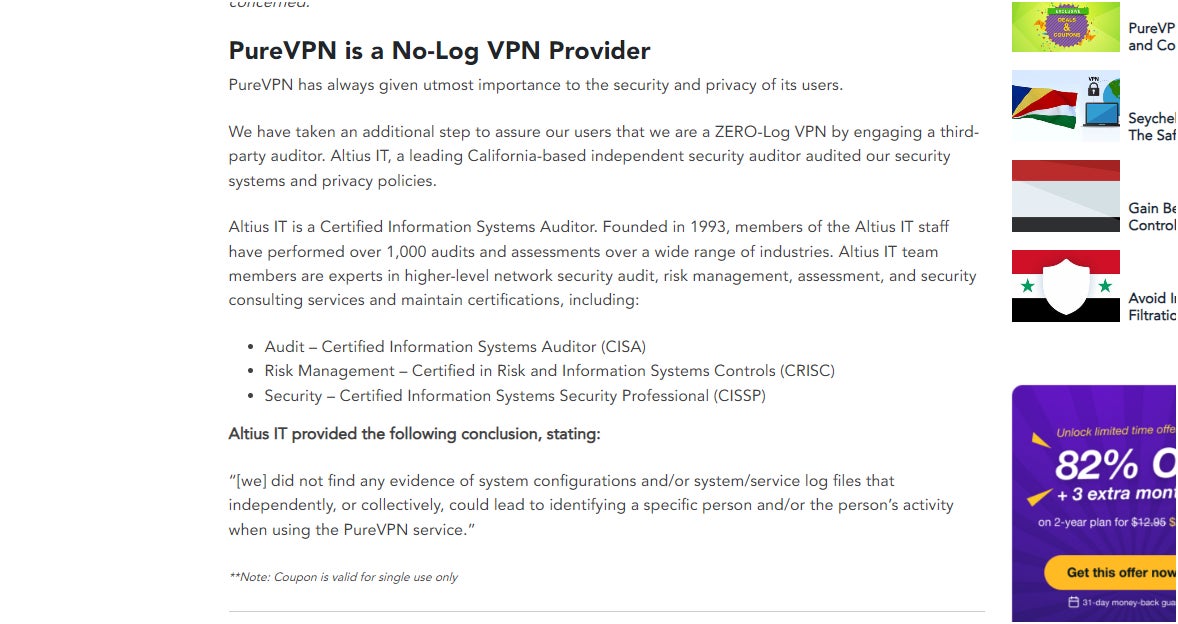
In this regard, I think PureVPN can do a much better job of making their third-party audits more accessible and more substantive. This would help strengthen their security claims and build trust amongst consumers.
Key features of PureVPN
If you’re considering PureVPN, it’s important to know the features that set it apart from other VPNs. Let’s take a look at some of PureVPN’s key features.
Large server suite
PureVPN comes with around 6,000+ servers worldwide, giving it a fairly substantial server fleet for the ordinary user. This is especially useful if you’re looking to unblock geo-restricted content, as it allows you more flexibility and choice in the servers you can use.
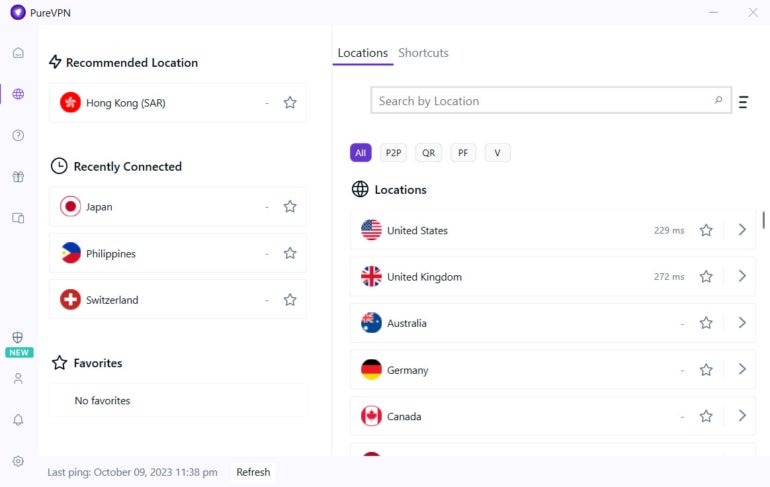
The PureVPN network also includes servers from 80+ locations and more than 65+ countries — a plus if you want to use a diverse set of servers from different regions. I do want to note that in 2024, the average country count for VPNs is continually increasing. Top VPNs like NordVPN, ExpressVPN, and Private Internet Access VPN now have server fleets with location options ranging from 90-105 countries, whereas the average was around 60-70 in years past. As PureVPN continues to develop its service, I’m hopeful that increasing their country options is one of their top priorities.
Split tunneling
PureVPN offers a split tunneling feature that allows you to control which online activity is routed through the VPN and which is routed through your regular internet service provider.
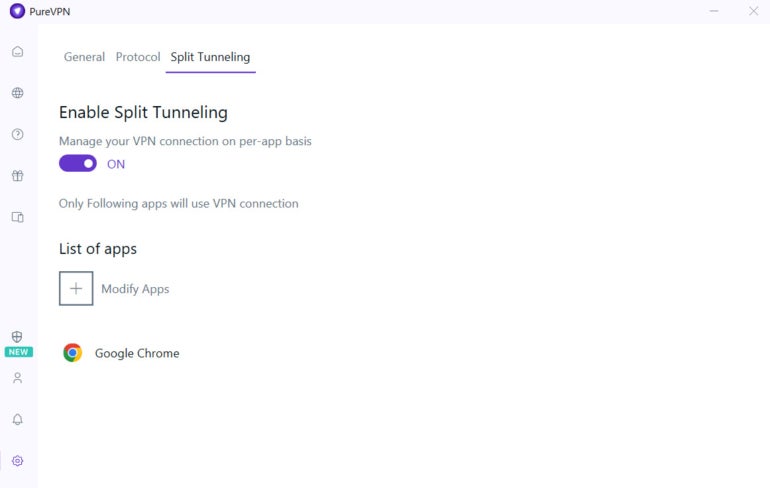
This is a convenient feature that will allow you to lessen the bottleneck on your VPN server’s speed because not all applications, such as music streaming, need VPN protection.
In my testing, PureVPN’s split tunneling worked as advertised and was able to reliably filter my chosen apps through the VPN properly. I want to mention, though, that split tunneling didn’t work for me while using PureVPN’s WireGuard protocol. This may be a bug either on my app or on PureVPN, but this has happened in my app for both 2023 and 2024. Hopefully, PureVPN allows split tunneling with the faster WireGuard in a future update.
Up to 10 device connections
PureVPN allows for 10 simultaneous device connections or logins. With some VPNs offering only 5–8 simultaneous connections, PureVPN’s 10 allowable logins is a significant value-add for users with multiple devices.
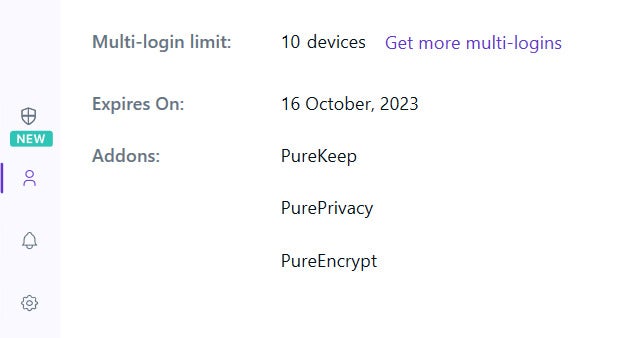
This can be an important budget consideration for prospective VPN users, especially if they’re worried about paying for another subscription only to accommodate more of their devices.
Speed and performance: How fast is PureVPN?
PureVPN offers fast speeds and an overall reliable connection. In my testing, I experienced relatively snappy speeds while using Google Workspace apps such as Docs, Drive, and Keep, streaming 1080p YouTube videos, web browsing for research, and attending online video meetings. Websites loaded fast, and I didn’t have any noticeable drops in speed or connectivity.
In terms of speed testing, PureVPN provided mixed results. For downloads, it was excellent, only dropping 14.44% in speed compared to my internet service provider. That’s fast when you consider how VPNs are expected to slow down speeds with the extra steps added to your traffic. However, PureVPN got more modest results for uploads, being 54.98% slower than my ISP. This was consistent with my speed tests from last year, where PureVPNs download and upload percentage decrease were at 5.98% and 79.92% respectively.
In this case, my findings show that users with upload-heavy workflows may get inconsistent performance while using PureVPN. If this is you, you may be better off looking at other options like ExpressVPN or Private Internet Access.
SEE: PureVPN vs NordVPN (2024): Which VPN Should You Choose? (TechRepublic)
To test for DNS leaks, I ran PureVPN multiple times using a public DNS leak tool. After multiple tests using different servers and locations, I recorded zero leaks.
PureVPN servers and locations
PureVPN grants users access to around 6,000+ servers in more than 80+ locations, spread across 65+ countries. In 2024, I praised PureVPN’s server network for being one of the larger server networks available. While its server count is still considerably large compared to the competition, I feel it now has some catching up to do in terms of country count.
Competing providers like NordVPN have increased their country spread from 60+ countries in 2023 to 111 countries in 2024. Meanwhile, Surfshark also offers an extensive 100-country server fleet with 3,200 servers. I’m optimistic that PureVPN follows suit in this regard, especially since its server network was one of its strongest features last year.
I still think PureVPN is a good option for those that primarily plan to use a VPN to bypass geo-blocked content. You just have to keep in mind that other VPN services have continued to develop their server fleets as well.
PureVPN also provides a healthy spread of servers worldwide.
| Continent | Servers |
|---|---|
| Europe | 2,992 servers |
| North America | 1,746 servers |
| Asia | 800 servers |
| Oceania | 350 servers |
| South America | 91 servers |
| Africa | 86 servers |
| Central America | 10 servers |
While the bulk of PureVPN’s servers are in Europe and North America, it’s still good to see that the network is able to provide options across all seven continents. In 2024, PureVPN has notably increased servers for Asia (now at 800 compared to 560 last year) and Central America (now at 10 servers from just four servers in 2023). If you’re eyeing IP locations from these regions specifically, this is good news.
I also appreciate how PureVPN automatically segments which of their servers are best for peer-to-peer file-sharing.
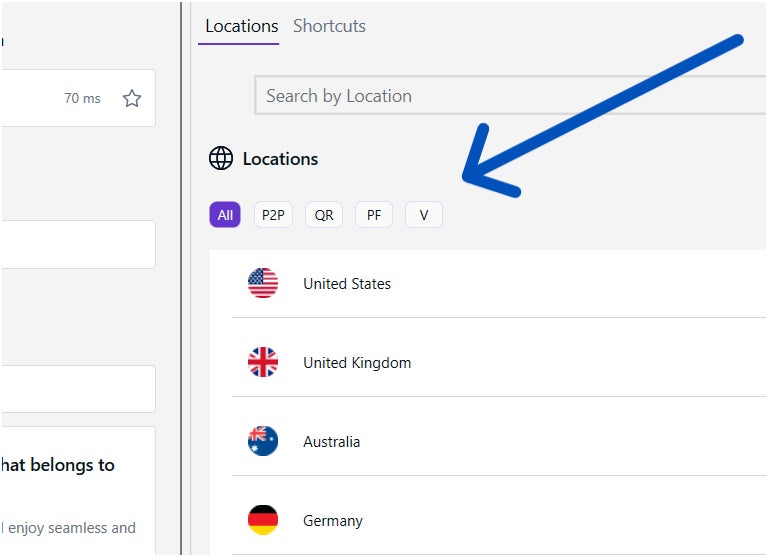
It lessens the steps you have to take if you want to use the VPN for torrenting. I wish PureVPN had more privacy-focused features out of the box, as its more unique security features (i.e., encrypted file-sharing and password manager) require additional payment. Otherwise, their server network is a definite strong point.
PureVPN customer service
When it comes to customer service, PureVPN offers an online knowledge base with guides and FAQs, an AI chatbot and live chat support, and a ticketing system. In my view, PureVPN’s support page offers a decent amount of information and helpful tutorial articles.
After testing out PureVPN’s live chat feature, I want to commend their support team, as I was connected to a live agent within two minutes of my request. In terms of answering questions, however, I found PureVPN’s support agent to be good but not great.
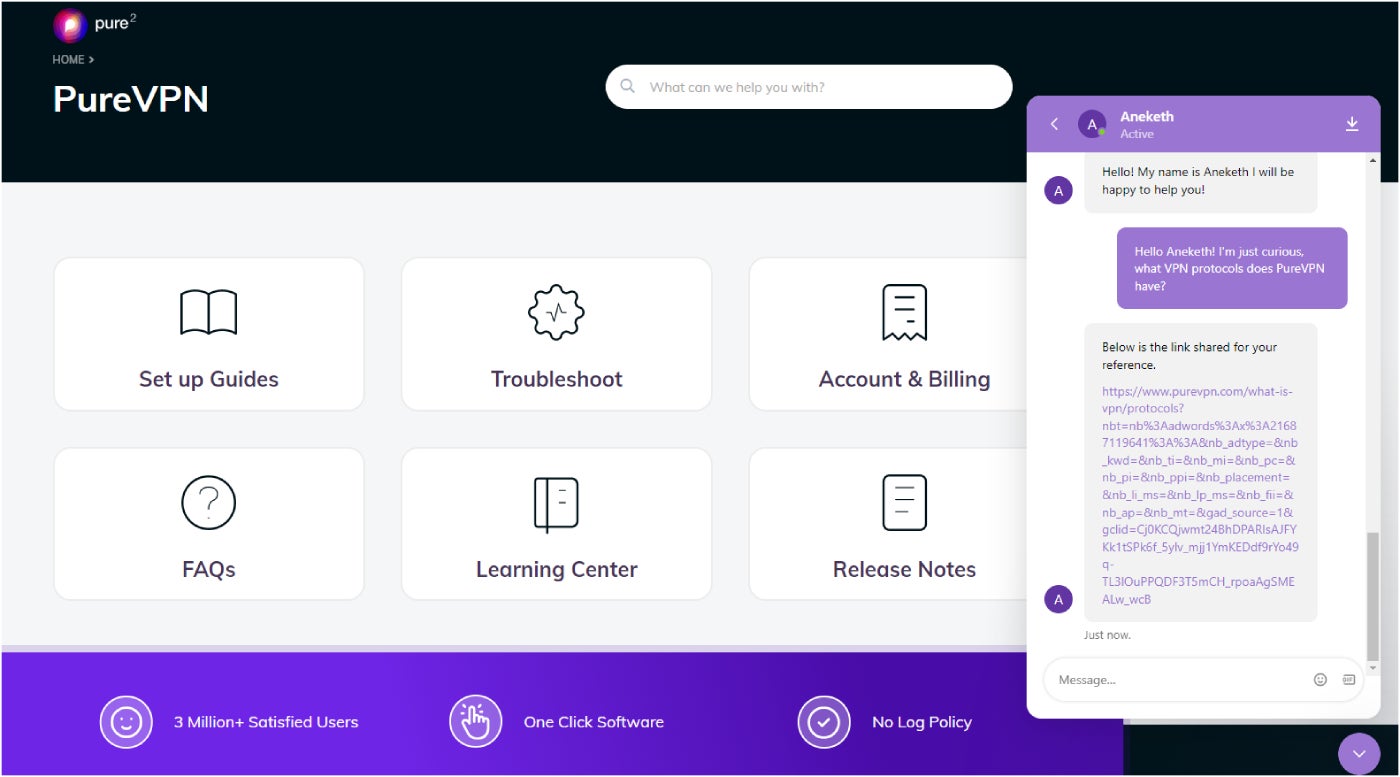
For the most part, it was able to address my mostly basic questions about the VPN. However, I did notice that it defaulted to giving me links from their support blog rather than answering directly. While the articles were useful, I would have preferred if the agent addressed my queries without having to leave our chat box.
Unfortunately, I did find a few user testimonials sharing how they didn’t have the most positive experience with PureVPN. One user in the PureVPN Reddit community said, “Got stuck in a really pointless conversation with the support chat today… 60 minutes of chatting – no problem got solved – and I am even not sure that the support understood my issue (I can’t connect with my dedicated IP to the internet)… really ridiculous.”
A few users also lamented how PureVPN changed features too often, such as adding or removing servers. In this regard, while I had a decent experience with PureVPN’s customer support, your mileage may vary depending on what you use it for.
PureVPN ease of use
For ease of use, I thought PureVPN had a relatively intuitive user interface. I mainly used PureVPN’s Windows application and found it to be minimalistic, well-organized, and user-friendly.
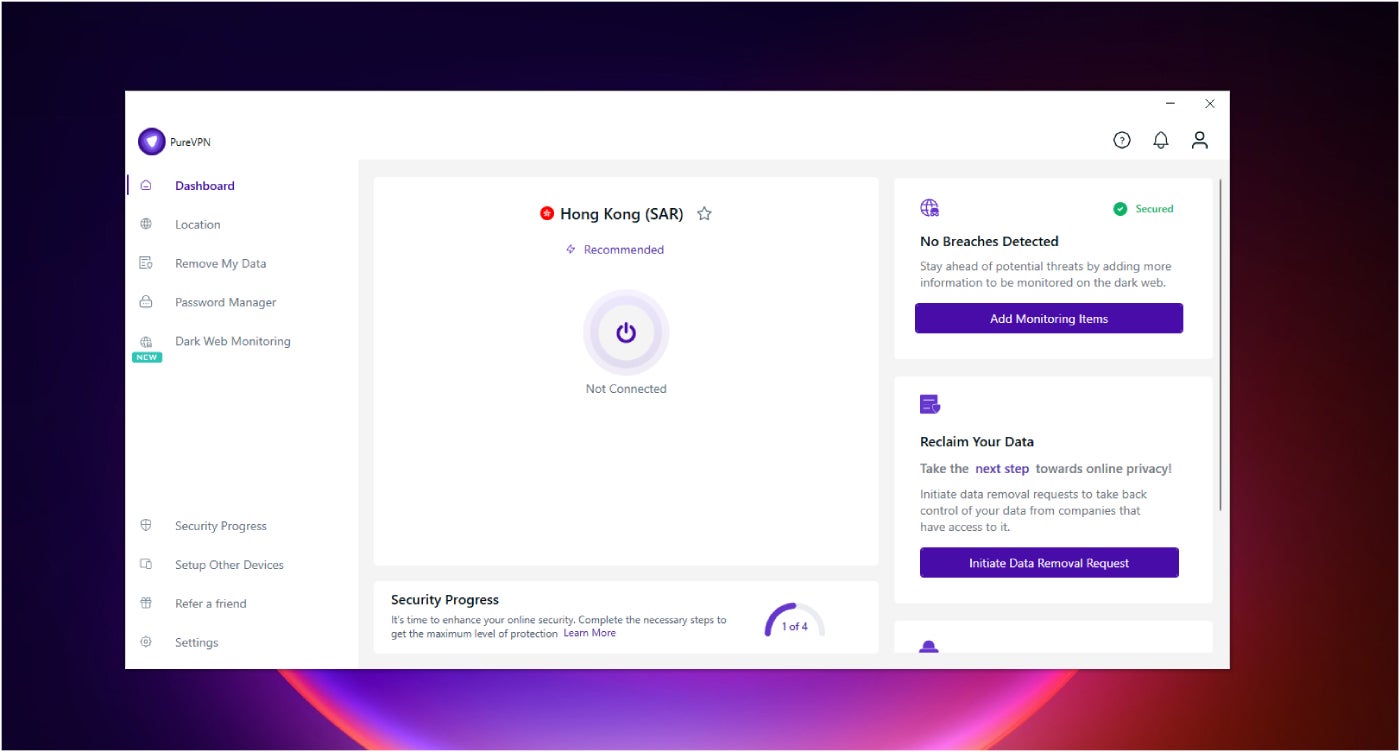
In terms of design, I liked the modern feel it had and how it didn’t feel too cluttered despite the extra features it had alongside the main VPN service. For context, I availed of the PureVPN Max seven-day free trial for this review.
One thing I did notice was a bit of clunkiness when it came to PureVPN’s app performance. I occasionally experienced a bit of lag when navigating through PureVPN’s menus, where it needed a second before getting to where I wanted to go. This also happened whenever I activated some of its extra features.
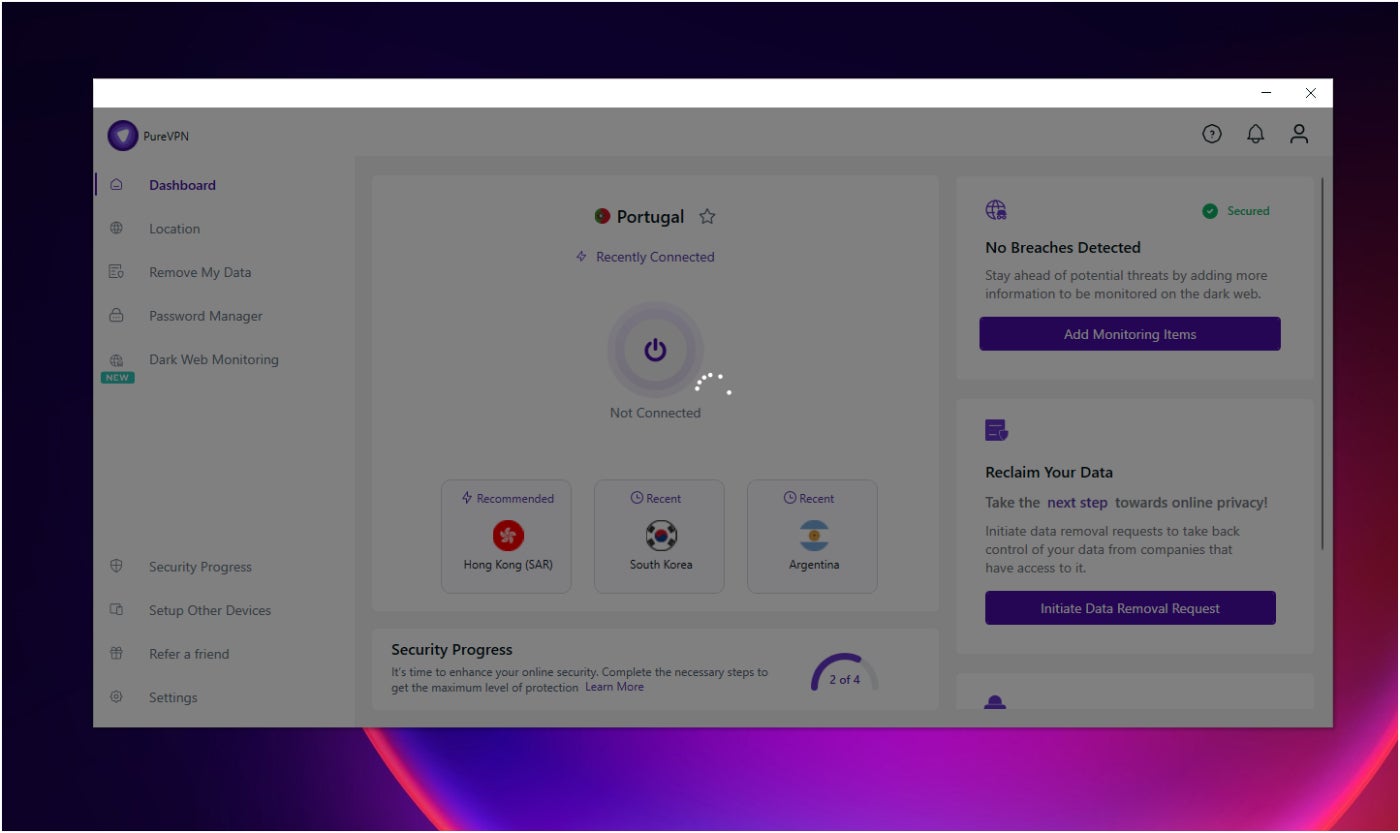
While this isn’t a dealbreaker by any means, I think it makes the whole app experience feel less polished than it could be. Of course, PureVPN can very much release a patch or update to make their desktop app feel faster. I’m keeping my fingers crossed on this, especially since they already have a well-designed UI in their hands.
SEE: IPVanish vs NordVPN (2024): Which VPN Is Better? (TechRepublic)
PureVPN pros
- Large network with 6,000+ servers.
- 7-day free trial via mobile.
- Up to 10 simultaneous device connections.
- Intuitive application.
- Relatively good speeds.
- Includes split tunneling feature.
PureVPN cons
- Prior incident handing off logs to FBI.
- Activating features feels a bit clunky.
- Unique security features are paid add-ons.
Who is PureVPN best for?
PureVPN is best for users who value having a large server network as one of their main considerations in a VPN service. Its 6,000+ servers across 65+ countries is a meaningful value proposition to unblock geo-restricted content or access servers in specific locations. PureVPN also offers generally good speeds within a minimal and intuitive user interface.
However, its logging incident with the FBI in 2017 prevents it from being a good pick if privacy and security are your main concerns. While it has made strides to rebuild customer trust, users looking for a VPN with a good track record in keeping their privacy and no logs policies should look elsewhere.
PureVPN alternatives
While PureVPN is a decent VPN solution, it may not have the right mix of features for your needs. We’ve listed below similar alternatives that could serve as better options.
SEE: How to Create an Effective Cybersecurity Awareness Program (TechRepublic Premium)
Mozilla VPN

If you’re a longtime user of the Firefox browser, Mozilla VPN may be a good option. Coming from the maker of Firefox, Mozilla VPN offers ad blocking, zero bandwidth restrictions, and multihop routing. It currently offers around 500+ servers in 30+ countries.
To learn more, read our full Mozilla VPN review.
ExpressVPN

For more security, ExpressVPN offers TrustedServer security that gives users additional privacy protection through independently audited, RAM-only servers. ExpressVPN also offers a choice of 17 other languages in both its app and browser extensions.
To learn more, read our full ExpressVPN review.
CyberGhost VPN

CyberGhostVPN is one of the best VPN picks for its country spread. It has servers in over 100 countries worldwide, making it a top choice for unblocking content in other regions. It also allows for seven simultaneous device connections and provides 24/7 live customer support.
To learn more, read our full CyberGhost VPN review.
How we evaluated PureVPN
My review of PureVPN involved a detailed analysis of its security features, cost, and real-world performance. I had hands-on time with PureVPN through its free trial via their mobile application. Specifically, I tested the version of PureVPN offered with the Max subscription on my Windows computer.
For upload and download speeds, I tested PureVPN using Ookla’s public Speedtest. To check for DNS leak protection, I ran PureVPN multiple times through DNSLeakTest.
Finally, I scored PureVPN on everything from its security protocols to its price based on an internal algorithm to get a rating of 3.7 out of 5 stars. I looked at PureVPN both on its own and in relation to other VPN services.

